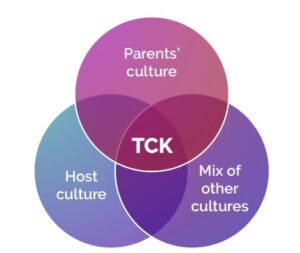Third Culture Katrina – Combining Culture with Mental Health and Psychological Practices
Katrina Rbeiz, 2024-25 RPW Center Graduate Student Fellow. This year’s group is exploring the theme of Emerging Technologies in Human Context: Past, Present, and Future.
As a Lebanese American woman growing up in six Middle Eastern and North African (MENA) countries, I developed a fascination for how human behavior and mental health are impacted by social environments. I consider myself to be a third culture kid (TCK), someone who was raised in a culture other than my parents’ or the culture of my nationality. I discuss my identity in this podcast, and how these experiences shaped my appreciation for cross-cultural experiences, and for highlighting people’s stories regarding their sense of belonging, their conceptualization of home, and their creative passions.
 When I expressed my interest in psychology to people in the MENA region, I was met with concerned looks. Given the cultural stigma surrounding mental health and the lack of cross-cultural diversity in psychological research, I am determined for my research and clinical work to:
When I expressed my interest in psychology to people in the MENA region, I was met with concerned looks. Given the cultural stigma surrounding mental health and the lack of cross-cultural diversity in psychological research, I am determined for my research and clinical work to:
1. document the unique cultural and social experiences of MENA immigrants and refugees using technological advances in virtual reality and geographical mapping tools
2. dispel the stigma surrounding mental health care in these communities through developing culturally sensitive interventions, practices, and measures
3. scientifically communicate research results to a wider audience through digital media
One project I am excited to explore is designing a geographical mapping task that asks people to shade in areas where they have felt emotions. For example, this method would investigate people’s experiences of loneliness, exclusion, and belonging, and would be supplemented with qualitative questions asking people to describe these experiences further, as well as fill out clinical self-reports of their emotional states. Ultimately, creating a mapping tool would illustrate the human experience of space as being intrinsically emotionally tinged. By investigating autobiographic memories, future aspirations, and natural spaces across geographic locations, we can better understand people’s mental wellbeing and physiological engagement in the world around us, as well as potentially build interventions that emphasize the importance of public health initiatives.
My goal in and beyond graduate school is to adopt an intersectional approach, which is why I would love to continue conducting research, practicing clinical work, and tailoring digital interventions to best support and collaborate with immigrant and refugee populations. I hope that these positions allow me to continue focusing on MENA wellbeing and addressing disparities in the measurement and diagnosis of serious mental illness in people of different ethnic and racial backgrounds.
 Katrina Rbeiz is a Lebanese American student in the Clinical Science PhD program. Her research broadly focuses on addressing disparities in the measurement and diagnosis of serious mental illness (SMI). She hopes to use a multimethod approach to develop culturally valid assessments and interventions, as well as to identify risk (e.g., trauma, discrimination) and resilience (e.g., ethnic identity, social connections) factors in the progression of SMI, particularly for Middle Eastern and North African populations.
Katrina Rbeiz is a Lebanese American student in the Clinical Science PhD program. Her research broadly focuses on addressing disparities in the measurement and diagnosis of serious mental illness (SMI). She hopes to use a multimethod approach to develop culturally valid assessments and interventions, as well as to identify risk (e.g., trauma, discrimination) and resilience (e.g., ethnic identity, social connections) factors in the progression of SMI, particularly for Middle Eastern and North African populations.